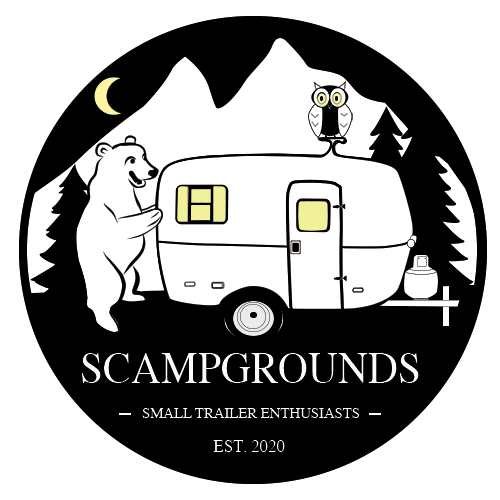UnderGlow Your Travel Trailer!
https://scampgrounds.com/wp-content/themes/osmosis/images/empty/thumbnail.jpg 150 150 gavin gavin https://secure.gravatar.com/avatar/99f9cd14e6ca957f921a5ace7d1dcdf0fccde566155f0e4da610ff0b7f10e2b0?s=96&d=mm&r=gUnderGlow Your Travel Trailer!
One of the coolest purely unnecessary things we’ve done to our Scamp has been to add an underglow LED lighting kit! It’s not necessary, but almost essential!
We installed the kit by MicTuning 4 POD RGBW LED Rock Light kit which has 4 LED pods. Given the small size of the Scamp trailer (13’), we’ve found that 4 LED PODS are enough to underlight the entire trailer. There are kits with more lights for larger trailers / vehicles, but this kit will work well for small trailers.
The kit comes with all the lights and cables necessary. All that needs to be done is to attach cables to the trailer battery, test the system by installing the MicTuning phone app, and then mount the LED pods and cabling on the trailer frame. Our friend Jon has a 3D printer and made some custom mounts that we glued strong rare earth magnets into, allowing the mounts to magnetically attach to the trailer frame. He also made some magnetic brackets to hold the cables against the trailer frame. As a precaution, we also secured the cable with Gorilla tape in select areas just in case a magnetic mount fails. We’ve driven with the magnetic mounts over 2,000 miles to date and they haven’t detached or moved from their position on the trailer. The kit does come with standard mounts and these should be satisfactory for mounting the PODS. Or, other custom methods could be used to secure the LED PODS on the trailer.
The Scamp trailer in itself looks futuristic, with its all-white glossy finish and egg shape (along with the HD antenna on the roof). However, lighting up the underside at night makes the Scamp look like a spaceship! People really notice it, and often oohs and aahs can be heard at the campsite! With the Bluetooth MicTuning app, the color of the lighting can be easily changed with just a tap on your phone screen. There is even a music mode that will strobe the lights in sync with the music playing on your phone! We’ve used these lights various times. On our first trip to Anza-Borrego State Park, it was so dark at night that it was really hard to find one’s way back to their trailer after dinner. Having the lights on made our Scamp easy to find and weren’t offensive since they glow down toward the ground. Be aware that one should not drive with the lights on as they could be distracting to other drivers and it is likely illegal in most, if not all, areas.
At a low cost and a high Wow! Factor, we highly recommend these LED ROCK lights! Light kit, liked it!
Disclaimer: You will get the same great Amazon price by clicking on the links here compared to buying directly on Amazon, but by buying here you will also be supporting the continuation of this website as we get a small commission from each sale. These are products and procedures we use for our own Scamp that we selected and developed from our own research and experiences. However, we do not endorse any specific product and cannot guarantee that the products we use are exemplary and the procedures we use are complete, accurate, detail the correct recommended procedures, or apply to your model small travel trailer. It’s always best to double check with your manufacturer or operation manuals to ensure you are doing everything correctly.













































































